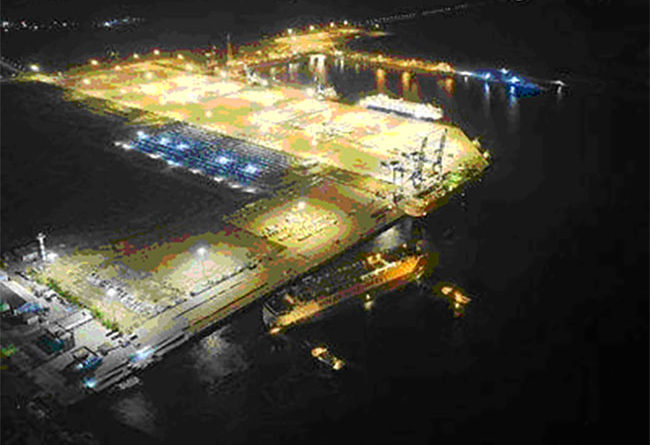Sri Lanka To Adopt ‘India First Approach’:The Island Nation Is Seeking To Undo Its Port Deal With China
27 August, 2020
Since its construction, the port has often been cited as an example of Chinese ‘debt diplomacy’ – a tactic whereby it sanctions huge loans to poorer countries so as to, ultimately, accumulate strategic assets.
Speaking on a Sri Lankan TV channel on Monday, Sri Lanka’s Foreign Secretary Jayanath Colombage noted that while the nation was looking to adopt a ‘neutral’ foreign policy stance, it will retain an “India first approach” as it related to strategic security matters. The foreign secretary also stated that the decision to lease out the Hambantota port to China was a “mistake.”
The Hambantota port in Sri Lanka.
Earlier this month, Sri Lanka People’s Front, the party of the the powerful Rajapaksa brothers, secured a landslide victory in the country’s parliamentary election enabling them to instiute constitutional changes. Sri Lankan President Gotabaya Rajapaksa, who was elected to the top seat in November 2019, swore in his brother and former president Mahinda Rajapaksa as the country’s prime minister on August 9.
Following the Rajapaksa’s resounding victory, Prime Minister Narendra Modi congratulated the two, with India’s External Affairs Minister S Jaishankar also reaching out to his counterpart Dinesh Gunawardane, as the two countries sought to build diplomatic consensus.
The return of the Rajapaksas to power may have significant consequences relating to the construction and operation of Sri Lanka’s Hambantota port, currently under Chinese management. The Rajapaksa government, having first come to power in 2005, sought to strengthen Sri Lanka’s economic relations with China with former President (now Prime Minister) Mahinda Rajapaksa welcoming Chinese lenders and contractors into Sri Lanka to spark an infrastructure boom. One of the key projects resulting from this was the development of the Hambantota port.
What Is The Controversy Around The Hambantota Port?
The port is an important constituent of China’s One Belt One Road (OBOR) initiative that will see China gain access to markets in West Africa, Europe and Asia, while increasing its strategic influence in the Indo-Pacific region. Since its construction, the port has been oft cited as an example of China’s ‘debt diplomacy’ – a predatory tactic by which the second largest economy in the world seeks to issue unsustainable loans to poorer nations such that they eventually default on them, leading to foreclosures that would see China accumulate strategic assets on foreign shores.
Following years of negotiations, the Rajapaksa government struck an agreement with China Harbor Engineering Company, one of Beijing’s largest state-owned enterprises, to construct a port in the coastal town of Hambantota, funded by the EXIM Bank of the People’s Republic of China. However, the years that followed from its opening in November 2010 saw it fail miserably, with a New York Times investigation noting that it drew just 34 ships in 2012, despite being located along one of the world’s busiest shipping lanes.
As a consequence, the Sri Lankan government struggled to service its debt payments to China. When the Rajapaksa government fell in 2015 to the Ranil Wickremesinghe-led government, the terms of the agreement were changed, and in 2017, the new government agreed to lease the port for a period of 99 years to a venture led by China Merchants Port Holdings Co for a sum of $1.1 billion. It is also worth noting that the deal allowed China to gain control of over 15,000 acres of land surrounding the port.
The port has previously been said to have “questionable commercial value” but according to Chinese operators who took over in 2017, it is now bearing fruit. By the end of 2018, the port operators stated that 300 vessels had been attracted, resulting in a 60 per cent growth in the number of cars shipped through the port to Africa, South America and the Middle East.
According to reports, President Gotabaya Rajapaksa now wants to undo the lease deal struck by the previous government. In November 2019, Ajith Nivard Cabraal, an economic adviser to Prime Minister Mahinda Rajapaksa, stated in an interview, “The ideal situation would be go back to status quo. We pay back the loan in due in the way that we had originally agreed without any disturbance at all.”
Although China has stated that the port will solely be used for commercial activity, questions over its sovereignty and Sri Lanka’s national security persist. Amending the terms of the bilateral agreement could prove to be a challenge and some analysts have noted that for the port to be returned to Sri Lankan control, the country may need to barter another asset of equal value.
Courtesy: Opera News/ timesnownews.com

